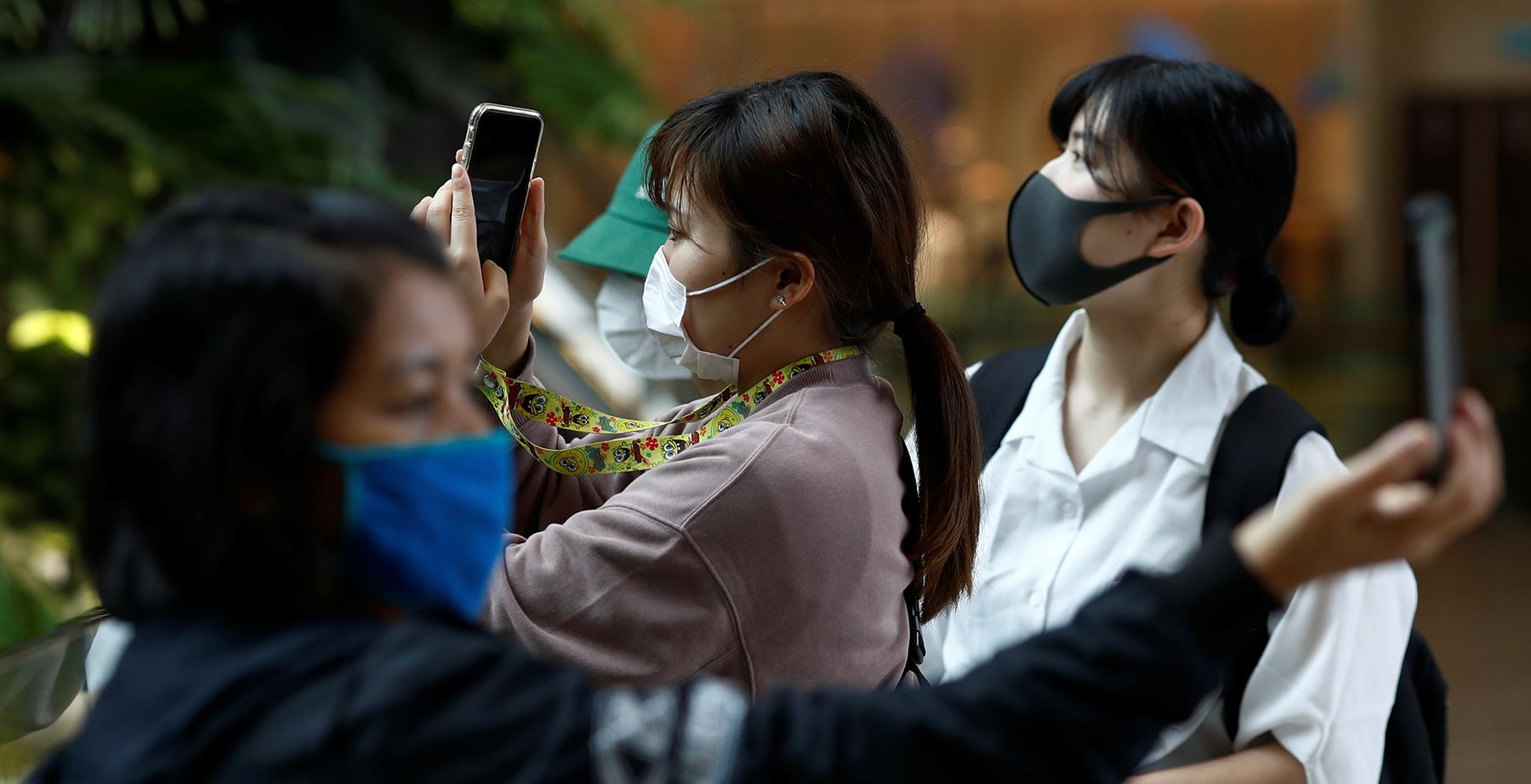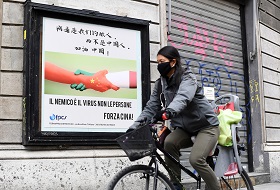After Coronavirus: “Nuda Vita” and the “Extraordinary Power” of the Modern State
(votes: 9, rating: 5) |
(9 votes) |
Ph.D. in Political Science, Leading Research Fellow, Head of the Center for Italian Studies, Institute of Europe of the Russian Academy of Sciences, Associate Professor at the National Research University Higher School of Economics, RIAC Expert
Over the past 20 years, the world and the system of international relations have been steadily moving towards a “state of emergency.” The “authority to do whatever was advisable to keep the state safe” that Carl Schmitt saw as the main sign of “extraordinary power” has long been the norm all over the world. And the evidence to support this is overwhelming. Instruments such as “humanitarian intervention,” the exclusion of rogue states from international engagement, the destruction of undesirable political leaders and the change of regimes through “revolutions,” and the introduction of political and economic sanctions are all used to restrict the sovereignty of states that are seen as a threat to international security or the security of specific states. The world is already used to the fact that the exclusion of some comes with the necessary assertion of the sovereignty of others. The intense demolition of the legal basis that underpins the outgoing world order and the withdrawal of individual states from international agreements that we have witnessed in recent years prove better than anything else that relations between states are now built upon this “state of emergency” and upon “extraordinary power.”
The choice of response strategy will, of course, be geared towards the interests of the nation, primarily due to national sociocultural specifics. However, even now, looking at how different societies have reacted to the measures that have been introduced and the level of trust that has been formed in response to these measures, we can assume that the most common strategy will likely be “exit.” This is due, first of all, to the fact that states — even Western liberal democracies that have more reason than most to count on the loyalty of their citizens — cannot guarantee the security of the population or even comply with the conditions of the social contract that EU taxpayer money has been paying for over the past several decades. The pandemic has opened the eyes of those in the most economically developed and liberal democracies to the fact that they have been living in a world of lies — from what they believed to be the most advanced medicine to Industry 4.0, which, as it turns out, was not able to manufacture enough medical masks. When the pandemic is over, “exit” for some will mean emigrating to a country with a more effective healthcare system, better social protection, superior business insurance, etc. For others, “exit” will mean the gradual transition to the “grey” or “black” areas of the economy. This will happen in countries where institutional trust was low before the crisis and continued to fall even further as a result of the ineffective steps taken by the state, or due to the unwillingness of the ruling class and big business to demonstrate social solidarity and share the hardships of rebuilding the economy with the middle class and SMEs. Still, others will see "exit" as an incentive for pursuing maximum autonomy in their lives: from switching to working from home and distance learning to subsistence farming. Others may experience "exit" as social marginalization. But one thing is already clear — in most states, the coronavirus will test the public's confidence in their respective governments. This means that sovereign states today need a balanced, well-thought-out and consistent strategy in order to gain the trust of their citizens and be able to carry out their “normalizing” role into the future, when the time comes to rebuild and recreate institutions and practices and after our fear of death has given way to the fear that there will be no future at all.
“Sovereignty is the refusal to accept limits …
I have refused to submit, therefore, I am.”
Georges Bataille, The Accursed Share [1]
Over the past 20 years, the world and the system of international relations have been steadily moving towards a “state of emergency.” The “authority to do whatever was advisable to keep the state safe” that Carl Schmitt saw as the main sign of “extraordinary power” has long been the norm all over the world. And the evidence to support this is overwhelming. Instruments such as “humanitarian intervention,” the exclusion of rogue states from international engagement, the destruction of undesirable political leaders and the change of regimes through “revolutions,” and the introduction of political and economic sanctions are all used to restrict the sovereignty of states that are seen as a threat to international security or the security of specific states. The world is already used to the fact that the exclusion of some comes with the necessary assertion of the sovereignty of others. The intense demolition of the legal basis that underpins the outgoing world order and the withdrawal of individual states from international agreements that we have witnessed in recent years prove better than anything else that relations between states are now built upon this “state of emergency” and upon “extraordinary power.”
That being said, it is extremely rare that a “state of emergency” appears inside a country: relations between the state and society have typically been built on the basis of established legislation and the basic law. However, with the outbreak of coronavirus (COVID-19) in early 2020, the very notion of a “state of emergency” has become a “viral” phenomenon as well, and it is Western liberal democracies that are primarily responsible for spreading it. The concept of “norms” and “normality” no longer apply to international relations. Moreover, they are not typical of relations between state and society inside countries. The “extraordinary power” that the state resorts to during pandemics penetrates deep into all spheres of life, depriving us of our basic rights and changing the very structure of the way we live from day to day. Numerous biopower practices are put into action — from controlling people's movement, rationing their consumption and restricting interactions with loved ones to compulsory health monitoring. The power of the sovereign has increased exponentially, while the sovereignty of the individual is crumbling before our very eyes. How will this period of increased “extraordinary power” affect relations between the state and the individual in the long term? How deeply will the trust of citizens in the state and its institutions be shaken if the latter cannot pass the litmus test in terms of guaranteeing security? When will we be able to return to “normal” life, if at all? If we will not, then what will the new “normal” be? And which of the “emergency” practices that are now in place will remain for a long time to come?
“Extraordinary power”: The Thin Line Between Legitimacy and Structural Violence

For Our Unfreedom and Yours!
Back in 1995, the famous Italian philosopher Giorgio Agamben published Homo Sacer: Sovereign Power and Bare Life [2], in which he demonstrated rather convincingly that every country, including liberal democracies, has a so-called “state of exception” where the individual is deprived of almost all rights and freedoms and exists in a state of “bare life” (nuda vita), living in the biological sense of the word only. Agamben used an analysis of the evolution of various political communities to demonstrate the "vitality" of this phenomenon in modern times — from the Nazi concentration camps to Guantanamo Bay and the refugee camps of today. By setting up areas like these, the modern state effectively isolates individuals who, as far as powers that be and society, in general, are concerned, pose or may pose a threat to "security." The ability to create these kinds of areas and declare states of exception is a key sign of sovereignty. The largest and most obvious illustration of a “state of exception” in recent times concerns migration in Europe, where EU countries fiercely tried to defend their sovereignty and the right to independently determine the parameters of “including” or “excluding” migrants from society.
Nevertheless, despite the fact that these zones and “states of exception” still exist to some degree, even in liberal democracies, the scale of this phenomenon has been limited up until now, with governments attempting to "fit in" into what is considered the "norm." There is a tacit understanding in society that “states of exception” are needed and potentially dangerous elements need to be isolated from the population at large. It is kind of an unwritten contract between the state and the individual, and more or less everyone agrees with the conditions for placing someone in the exclusion zone. For example, the Patriot Act passed by the United States after 9/11 served as a way to justify the restrictions on the fundamental rights and freedoms of U.S. citizens. We have come to terms with the security services using tracking technologies as a way to identify terrorists, with governments monitoring our social media content in order to fight extremism, with CCTV cameras everywhere to ensure that we follow the road safety rules, with biometric passports for tracking illegal border crossings, and so on.
However, it turns out that the concept of the state as a “night watchman” hired to protect our human rights and interfere in our private lives with the sole aim of ensuring our safety and to an extent proportional to the threat, is only useful during “normal” times, when the type and scale of threat is known and is sporadic or local in nature.
The coronavirus pandemic, which politicians are increasingly comparing to an enemy in a war, requires a completely different kind of intervention in the everyday lives of citizens. State sovereignty has ballooned to almost unlimited proportions, at the expense of the sovereignty of the individual. Emergency directives passed, without parliamentary discussion, on the basis of nothing more than the “insight” of decision-makers who are supposedly able to assess the magnitude of the threat and take “adequate” measures, are used to restrict the basic rights of citizens. This includes freedom of movement, health protection, social interaction, education, etc. However, the problem is that in most Western countries there is no broad consensus on how big the threat actually is, which means that there can be no agreement on the degree to which government intervention is acceptable and which “extraordinary powers” may be appropriate. This much is evident from the sheer number of fines that have been handed out for violating the lockdowns. For example, over 72,000 violations were recorded in Italy over the period from March 11 to March 20. In Austria, people seem undeterred by the fines, which have been set at several thousand euros, as they continue to go out for walks and happily stop for a chat in the fresh air. But how is this lack of consensus dangerous when it comes to understanding security threats and evaluating the measures taken? Does this mean that the state has lost its ability to “mobilize” the population and is no longer able to demonstrate true “emergency” power? Why was China able to implement emergency measures to far greater effect than European countries? It would seem that the explanation is in the specifics of the functioning of “extraordinary power,” or, more specifically, in the fine line between legitimacy and structural violence. Let us elaborate on this fine line.
The almost universal introduction of a “state of emergency” brings to mind the classics of political thought, who devoted far more attention to matters of state and society. The key arguments put forward by Carl Schmitt in his Dictatorship [3], where he provides a detailed discussion on the exercise of “extraordinary power,” are particularly pertinent. Schmitt made a distinction between “what was legally regulated — that is, a limited exercise of the sovereignty,” and the “substance, always remaining hidden but at hand, and in principle unlimited, of the omnipotence of the state,” whose “self-commitment through ordinary legislation only held for situations considered to be normal.” And in abnormal situations, or what Schmitt would call a “state of siege,” sovereignty is manifested as “an authority, in principle unlimited, in order to do whatever was advisable to keep the state safe.” However, such broad powers require an extremely high level of trust in the authorities on the part of citizens. It is clear that liberal democracies that are used to the state acting as a “night watchman" are affected more by the transformation towards an authority that is "in principle unlimited." Hence the need for a high level of trust: when the laws that make the interaction between state and society "normal" no longer work, trust remains the only mechanism that informs the legitimacy of the actions taken by the authorities in an emergency situation. Extraordinary power creates a new “normality,” and its normalizing force (according to Michel Foucault) increases many times over. Similarly, in the absence of trust, people see emergency measures as a form of structural violence. That is, Johan Galtung [4] and his followers point out, it is seen as an unlawful incursion into the private affairs of the individual. The consequences of such an “unsanctioned” incursion may end up costing the country’s political leadership what is left of its power, as well as the ability to exercise a “normalizing power.” This is why the sequence of measures taken in a crisis situation and the discourse used by the country’s leadership to legitimize their actions and gain the trust of citizens are so important.
If we look at how emergency measures were implemented in Europe from this point of view — and in Italy in particular, which has been affected the most by the pandemic — we see that trust is indeed a key condition when it comes to determining the effectiveness of emergency measures. Italy was the first hotspot of the pandemic in Europe. It quickly moved into second place in the world in terms of the number of infected, behind China, and soon after surpassed that country in the number of deaths. Little was known about the pandemic in February 2020, and even less about how China — a country that the West has a hard time trusting — was dealing with it. Hence the extreme caution and indecision of the Italian leadership and the resulting outbreak and deaths. With all the will in the world, the Italian government simply did not have enough information about the nature of the threat. Consequently, it was unable to form a narrative that would have allowed society to move quickly and accept the restrictions. Cynical as it may sound given the circumstances, other European countries were in a better situation to deal with the impending crisis, as they had learnt from how both China and Italy had responded to the threat and had a much clearer picture of exactly what they were facing. The price of freedom for each individual depreciated in proportion to his or her understanding of the seriousness of the threat. As fear grew, so too did the demands for the state to provide security guarantees, which in turn reduced the likelihood that the measures introduced would be seen as structural violence. This allowed several European countries to rush strict measures through — measures that most people saw as legitimate and justified. This is why control over information is so important in times of “extraordinary power” — many countries have already started monitoring fake news about coronavirus, as they understand that this is the most important factor when it comes to building trust. However, even the strict information control, the endless references to the authority of specialists, the “war” discourse that is increasingly being used by politicians in reference to coronavirus and the tragic reports coming from Italy are not always convincing enough. “Sovereignty is the refusal to accept limits… I have refused to submit, therefore, I am,” wrote Georges Bataille in The Accursed Share. As the current situation has shown, ordinary citizens of European countries with liberal democracies are not ready to give up their sovereignty and start to fully trust the state without a fight.

The World After COVID-19: Does Transparent Mean Healthy?
What about Russia? Russia has had even more time than other European countries to prepare its citizens for decisive measures. However, despite the fact that by mid-April 2020 the coronavirus had claimed more than 20,000 Italian lives and the number of infected in Russia had exceeded that figure, the Kremlin had not declared a state of emergency, the country was still not in full lockdown (a not-so-strict form of “self-isolation” is in place), and mixed signals were being sent about the possibility of more stringent measures being introduced. The government is developing a large-scale electronic system for tracking the movement of its citizens whereby drivers would need to obtain a QR code in order to move around Moscow and Moscow Region, but it has not been implemented yet. Movement between regions has not been suspended. It would seem that the country’s leadership can sense the fine line between legitimate measures and structural violence and is afraid to take more radical action, clearly waiting for the population to unequivocally ask for harsher measures. In other words, the government is waiting for a clear demonstration of trust on the part of its citizens. The trap, however, is that inconstant and one-sided measures can bring about a crisis of confidence far quicker than suddenly restricting the rights and freedoms of citizens in order to ensure security.
Business is also in a state of uncertainty, as it is still unclear who can and cannot work from home, how remote working will be implemented from a technical standpoint, what monitoring practices will be put in place to catch businesses that continue their operations and try to get their employees to continue to work, and what the authorities plan to do next in terms of saving Russian business. Most Russians saw the non-working week from March 30 to April 5 as extra vacation, an opportunity to head out to the park and wind down. Many businesses resumed operations on April 6, a fact that could lead to a sharp increase in the number of infections in the coming weeks. The move to tax those with over 1 million roubles in bank savings was not received well, as people saw it as the government taking the opportunity to pick the pockets of the burgeoning middle class (we use the term rather loosely here, as the Russian middle class is hardly comparable to the European middle class, for example), which had only just managed to accumulate such a safety net, instead of trying to rally the population by taxing large companies and monopolies. Most people see decisions such as these as rather shady. What is more, the process of deferring loan, mortgage and tax payments will require a lot of paperwork and procedural expenses, which will, in turn, reduce the public's confidence in the state acting as a guarantor and insurer of the costs incurred. Business has little confidence in the government as it is, and this will only hit it harder. But the hardest hit of all will be those who operate in the “grey” and “black” areas of the economy — those had no trust in the state even before the crisis began — as there is no hope of them receiving any kind of financial support. And what will happen to the people they employ — the thousands of illegal immigrants who often work “off the books” with no labour rights or means of livelihood in a foreign country? Will they voluntarily self-isolate? Or will they go to any extreme in order to provide for themselves and for their families? Will the state be able to mobilize the necessary resources to prevent rampant crime in the most disintegrated part of society?
The State as the Sole Subject of “Extraordinary Power”
Despite the fact that the West has been talking about the need for a common response to global security challenges for decades now, the COVID-19 pandemic has demonstrated that we are still woefully unprepared to deliver such a response. And this, despite the fact that the pandemic is neither a political nor an ideological challenge. The touchstone of supranational integration, the European Union, is on the verge of taking away one of its four freedoms — the freedom of movement for EU citizens. The Schengen Area has been temporarily closed. All migration inside and outside the European Union has been suspended, and its countries are making sovereign decisions based on assessments of the appropriateness of restrictive measures. Meanwhile, these measures touch on the very essence of the sovereignty of the individual in a democratic society, namely, the right to freedom of movement, the right to work and the right to the protection of one’s health and safety. In the three months since the pandemic began, the World Health Organization, G7 and G20 have not made a single binding decision, and the UN Security Council has remained silent. The European Union is trying to agree on economic support measures for its member countries, and while the Stability and Growth Pact (SGP) has been suspended and countries have been allowed to violate fiscal and budgetary discipline, the idea of introducing so-called “coronabonds” (Euro obligations that would allow European Stability Mechanism funds to be spent on measures to overcome to consequences of the crisis) supported by Italy, Spain and Portugal, but not so much by Germany and the Netherlands, has split Northern and Southern Europe once again. Italy, which has been hit the hardest by the virus, is perhaps most acutely aware of the consequences of “losing a part of its sovereignty” to supranational European institutions: the reduction of hospital beds and medical staff was a direct result of the “austerity” measures put in place by Brussels in the early 2010s. Obviously, the discussion on the need to return sovereignty to the national level developed by the Italian side, specifically by Lega Nord, is quickly gathering steam. In Hungary, Prime Minister Viktor Orbán has received parliamentary approval to extend the state of emergency for as long necessary and to adopt “emergency” decrees, while the European Union stands back and points fingers, thus underscoring its helplessness in the face of yet another triumph for national sovereignty.
We can confidently state today that the nation-state remains the only subject of "extraordinary power" — a sovereign capable of defining the boundaries of the new "norm" and the subject of biopower in the territory that is subject to control. As the experience of combatting the pandemic in the European Union has demonstrated, it is the state alone that possesses the necessary resources to exercise control, guarantee security and reallocate resources in an emergency. National governments are still in control, among numerous other functions, of the police, the emergency services, the tracking of their citizens’ movements, information control technologies, the management of the labour market and industrial production and the redistribution and mobilization of resources within their respective countries, and the crisis has highlighted how quickly parts of these functions that have been delegated to supranational structures can be returned to the purview of national governments. The pandemic has also demonstrated that citizens invariably turn to the state and their national governments for protection.
For many states, the pandemic will likely be a way to test the boundaries and limits of "extraordinary power." And every day it becomes increasingly obvious that these limits are linked to sociocultural considerations, which also respect national borders. For example. The freedom-loving French and Italians are now (finally) prepared to sit at home in order to save the older generation; the Chinese have spent their last savings on the production of masks and medicines; and the Japanese, who were already quite used to and accepting of social distancing and wearing masks, have taken the new demands in their stride; the Russians, upon learning that they would have to give the state a percentage of their savings during the crisis, rushed to their banks to withdraw money; while the people of Turkmenistan have been forbidden from saying the word “coronavirus” and wearing masks and may be sent to prison for ignoring the rules — in short, there is no such thing as coronavirus in Turkmenistan, and everyone agrees. All this “blooming complexity” in just a few months has laid bare the level of trust between citizens and the state, with each individual case demonstrating how far the state is prepared to go and how much society is prepared to tolerate. Many governments have started to seriously tighten information control against the backdrop of the fight against the pandemic. For example, a number of countries have introduced fines for spreading false information, and it is, of course, the government that decides which information is false, and it does not matter that much of the “knowledge” about this little-studied threat, even if it comes from respected scientists, can be refuted and become fake news in as little as a week. But information can be an incredibly powerful resource in times of “extraordinary power,” something that the government simply cannot fail to privatize, as information is the foundation of trust.
The Consequences of “Extraordinary Power”: A Large-Scale Crisis of Confidence

Coronavirus: A New Bug or Feature of World Politics?
Trust becomes a strategic resource when institutions stop working. “Extraordinary power,” which has become the norm following the introduction (official or otherwise) of a state of emergency essentially means that governments are functioning on an ad hoc basis. Some states have long abandoned this practice and are finding it increasingly difficult to return to the “will of the sovereign” from institutionalized formal processes. For those who are used to living in the “manual control” regime, where institutional trust is typically low due to the fact that institutions have always been a “bonus” that the sovereign can use at its discretion, “extraordinary power” is, if not the norm, always tacitly understood as the scenario that is most likely to unfold in any given situation. Whatever the case may be, we are witnessing a deep crisis of confidence brought about by the fact that neither the institutions that seemed stable and effective, nor the forethought or farsightedness of the “wise leader” were able to prevent matters from taking a turn for the worse.
As we know from the works of Albert Hirschman [5], there are three basic types of attitude towards the state an individual can possibly adopt: exit, voice and loyalty. “Loyalty” is only possible when there is a high level of trust. “Voice” is an open protest that requires people to be ready to take social action, something that is unlikely given the current rules regarding social distancing and the fines for breaking them. “Exit” is the most realistic strategy when there is a lack of trust and the price of protest is too high. The "extraordinary powers" that are being implemented all over the planet today offer us a glimpse of just how high: the mobilization of the police, army and other guard forces; the experimentation with all manner of digital and physical control; and the introduction of various sanctions (financial, administrative and custodial). It thus follows that all the talk about globalization, the blurring of borders, the freedom of movement, and so on, is only possible as long as national governments allow it, all the while retaining the right to nix all these developments and implement their own instruments of control.
The choice of response strategy will, of course, be geared towards the interests of the nation, primarily due to national sociocultural specifics. However, even now, looking at how different societies have reacted to the measures that have been introduced and the level of trust that has been formed in response to these measures, we can assume that the most common strategy will likely be “exit.” This is due, first of all, to the fact that states — even Western liberal democracies that have more reason than most to count on the loyalty of their citizens — cannot guarantee the security of the population or even comply with the conditions of the social contract that EU taxpayer money has been paying for over the past several decades. The pandemic has opened the eyes of those in the most economically developed and liberal democracies to the fact that they have been living in a world of lies — from what they believed to be the most advanced medicine to Industry 4.0, which, as it turns out, was not able to manufacture enough medical masks. When the pandemic is over, “exit” for some will mean emigrating to a country with a more effective healthcare system, better social protection, superior business insurance, etc. For others, “exit” will mean the gradual transition to the “grey” or “black” areas of the economy. This will happen in countries where institutional trust was low before the crisis and continued to fall even further as a result of the ineffective steps taken by the state, or due to the unwillingness of the ruling class and big business to demonstrate social solidarity and share the hardships of rebuilding the economy with the middle class and SMEs. Still, others will see "exit" as an incentive for pursuing maximum autonomy in their lives: from switching to working from home and distance learning to subsistence farming. Others may experience "exit" as social marginalization. But one thing is already clear — in most states, the coronavirus will test the public's confidence in their respective governments. This means that sovereign states today need a balanced, well-thought-out and consistent strategy in order to gain the trust of their citizens and be able to carry out their “normalizing” role into the future, when the time comes to rebuild and recreate institutions and practices and after our fear of death has given way to the fear that there will be no future at all.
1. Bataille, Georges. 2006. The Accursed Share. Мoscow.
2. Agamben G. 1998. Homo Sacer: Sovereign Power and Bare Life. Stanford.
3. Schmitt, Carl. 2005. Dictatorship. St. Petersburg.
4. Galtung J. Violence, Peace, and Peace Research // Journal of Peace Research. Vol. 6. No. 3 (1969), pp. 167–191.
5. Hirschman A. 1970. Exit, Voice and Loyalty. Cambridge, Mass.
(votes: 9, rating: 5) |
(9 votes) |
Preliminary results of the coronavirus test on society show the lack of instinct that is inherent in anybiological species to protect its population
The World After COVID-19: Does Transparent Mean Healthy?Perhaps the coronavirus pandemic will break down the old world order and give rise to the new one that so many expected to appear in the 1990s.
The Spread of the COVID-2019 Epidemic across Europe and MultilateralismThe value and significance of multilateralism are becoming increasingly apparent against the backdrop of the fight against the coronavirus epidemic
For Our Unfreedom and Yours!Some principles of the “responsible restriction of freedom” that the authorities of all countries should think about when such restrictions are inevitable
Rethinking International Security for a Post-Pandemic WorldFor the first time in living memory, humanity is confronting a common threat that it must defeat collectively. It is time to start planning for when the eventual victory comes






